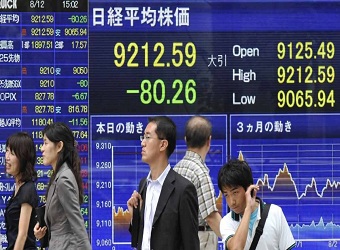Asian markets mostly rose on Monday after the U.S.’s S&P 500 extended its winning streak on Friday to six days. Markets in the Greater China region remain closed for the Lunar New Year holiday.
Japan’s Nikkei 225 rose 1.72 percent, while the Topix index was up 1.89 percent. South Korea’s Kospi index gained 0.91 percent.
Meanwhile, Australia’s ASX 200 reversed early losses to trade up 0.66 percent. The heavily weighted financial subindex rose 0.56 percent, while the energy sector fell 0.91 percent and the materials subindex reversed losses to climb 0.21 percent.
Oil stocks in Australia traded mixed. Shares of Santos rose 2.28 percent, Oil Search was up 2.42 percent and Beach Energy added 7.11 percent.
Woodside Petroleum declined 6.26 percent, however, after the company said it completed the institutional component of its 2.5 billion Australian dollar ($1.98 billion) share sale, announced on February 14. Woodside raised gross proceeds of about A$1.57 billion at A$27 per new share.
Markets in India bucked the generally positive trend in the region. The Nifty index was down 0.5 percent and the Sensex fell 0.61 percent.
Still, major indexes in the U.S. ended off their session highs after news broke that special counsel Robert Mueller indicted 13 Russian nationals and three Russian entities for allegedly interfering with the 2016 U.S. presidential election.
Meanwhile, in the currency market, the Japanese yen traded at 106.43 to the dollar at 12:45 p.m. HK/SIN, coming off an earlier high of 106.08. Still, the yen had strengthened from levels above 108 in the previous week. Major export stocks traded up, with Toyota shares climbing 2.23 percent, Honda up 1.7 percent and Sony adding 0.34 percent.
The Australian dollar traded at $0.7916 at 12:46 p.m. HK/SIN, falling from levels near $0.7980 reached last week.
Elsewhere, the dollar index remained relatively stable and traded at 89.081, coming off an earlier high of 89.115. Last week, the index fell from levels above 90 to near 88.200 before recovering slightly.
“The U.S. dollar staged a minor comeback for no obvious reason other than position squaring into the U.S. holiday weekend, with euro leading the move and yen lagging but still managing to fully recoup the APAC session swoon to end marginally weaker on the day,” Ray Attrill, head of foreign exchange strategy at the National Bank of Australia, wrote in a morning note.
He pointed out that for the week, the dollar was still lower in index terms with losses led by the yen strength.
The U.S. market will be closed on Monday for Presidents Day. Source: CNBC
Source: CNBC


